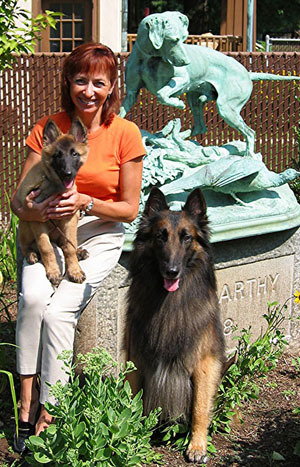

Feisty Fidos - Reintegrating Them Into the Canine Society
Owning a dog aggressive dog is very disturbing to owners. It can also be a difficult problem to resolve. People are embarrassed and don't know what to do when their dog is lunging at another dog. Consequently, many of these dogs are isolated from other dogs for the rest of their lives, surrendered to shelters or euthanized. Over the decade, we have seen an increase in the number of dog-to-dog aggression cases. Why is there an increase? Can these dogs ever be re-introduced into the canine community and is this what the owner really wants, or do they just want to be able to take their dog into public with some confidence that fights will not occur?
"Whatcha Lookin' At?" - A Match NOT made in Heaven!When the joys of living with more than one dog is replaced with a 24-hour referee job, one must sit down and think whether the constant conflict between resident dogs is taking a toll on the entire "pack." Is the fighting affecting the quality of life of one or more dogs? Can the average pet owner begin to learn about canine social behavior to better understand the triggers that may be causing the fights? So-called "sibling rivalry" is an on-going struggle between two or more dogs who reside together. They may range from scuffling and toxic play to serious fights. One or both may require medical attention. Is the fighting "clean" or "dirty?" Is the owner always present or absent? These are just some questions which we need to look into to help resolve the problem. Case histories will be reviewed as well as a variety of behavioral protocols for each type of case. Petite Pals - Who says little dogs don't need training?Do small dogs require the same training as their fellow 60 pounders? Is it fair to put a 3 lb. Yorkie in the same class as a 90 lb. Labrador? Are people avoiding class because they are fearful for their little tykes? Or, do owners really think little dogs aren't much of a nuisance and don't require training? We've listened to owners' concerns and as a result, developed a training course specifically designed for dogs 30 lbs. or less. Training is done in an environment designed to make learning more enjoyable and comfortable for both owner and dog. Many small dogs rarely leave the house, especially during the cold weather. This course helps maintain behavioral health as well as continued socialization and mental stimulation. Demos and videos will be shown to get you thinking and SMILING! Oh, so cute! Romper Room Gone Postal - Devil PuppiesDo the risks outweigh the benefits of puppy training and socialization classes? A well-run puppy kindergarten class can definitely get puppies off to a good start. Understanding dogs' social behavior is a crucial part of conducting a successful class. But, who is coming to class and what is being taught? Are trainers interpreting the behaviors and interactions correctly? Do they truly understand and implement proper socialization techniques? Have trainers gotten cold feet about using the word punishment in their repertoire? Are puppies leaving class ill-mannered, fearful or even worse, an accident waiting to happen as a result? We've seen a massive increase in dog-dog aggression. Can puppy classes be contributing to this? If so, where have we gone wrong? If you've asked yourself these questions, this seminar is for you. Video clips will be shown and discussed. |









